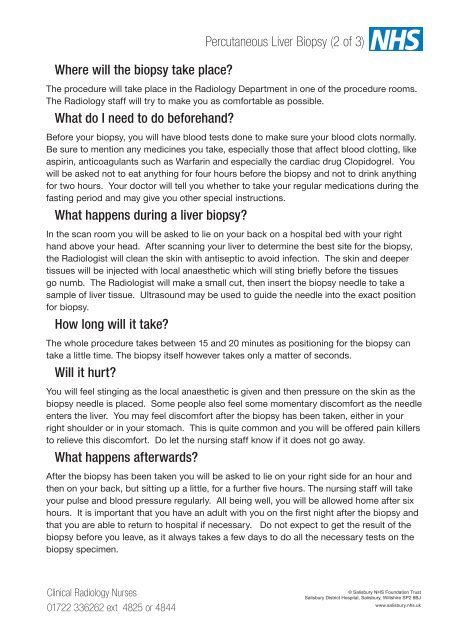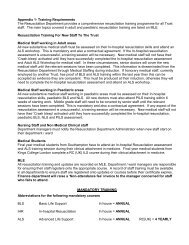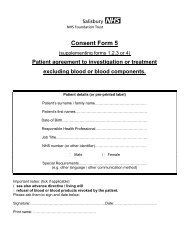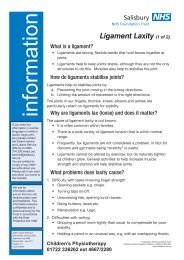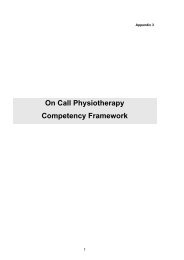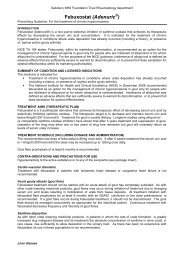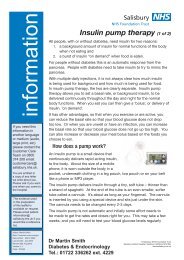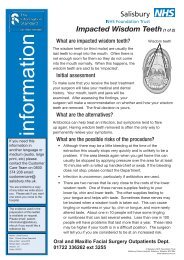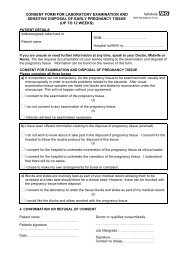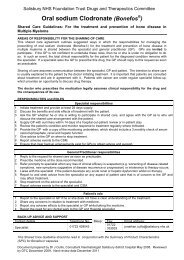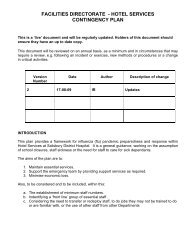Percutaneous Liver Biopsy - ICID - Salisbury NHS Foundation Trust
Percutaneous Liver Biopsy - ICID - Salisbury NHS Foundation Trust
Percutaneous Liver Biopsy - ICID - Salisbury NHS Foundation Trust
You also want an ePaper? Increase the reach of your titles
YUMPU automatically turns print PDFs into web optimized ePapers that Google loves.
Where will the biopsy take place?<br />
<strong>Percutaneous</strong> <strong>Liver</strong> <strong>Biopsy</strong> (2 of 3)<br />
The procedure will take place in the Radiology Department in one of the procedure rooms.<br />
The Radiology staff will try to make you as comfortable as possible.<br />
What do I need to do beforehand?<br />
Before your biopsy, you will have blood tests done to make sure your blood clots normally.<br />
Be sure to mention any medicines you take, especially those that affect blood clotting, like<br />
aspirin, anticoagulants such as Warfarin and especially the cardiac drug Clopidogrel. You<br />
will be asked not to eat anything for four hours before the biopsy and not to drink anything<br />
for two hours. Your doctor will tell you whether to take your regular medications during the<br />
fasting period and may give you other special instructions.<br />
What happens during a liver biopsy?<br />
In the scan room you will be asked to lie on your back on a hospital bed with your right<br />
hand above your head. After scanning your liver to determine the best site for the biopsy,<br />
the Radiologist will clean the skin with antiseptic to avoid infection. The skin and deeper<br />
tissues will be injected with local anaesthetic which will sting briefly before the tissues<br />
go numb. The Radiologist will make a small cut, then insert the biopsy needle to take a<br />
sample of liver tissue. Ultrasound may be used to guide the needle into the exact position<br />
for biopsy.<br />
How long will it take?<br />
The whole procedure takes between 15 and 20 minutes as positioning for the biopsy can<br />
take a little time. The biopsy itself however takes only a matter of seconds.<br />
Will it hurt?<br />
You will feel stinging as the local anaesthetic is given and then pressure on the skin as the<br />
biopsy needle is placed. Some people also feel some momentary discomfort as the needle<br />
enters the liver. You may feel discomfort after the biopsy has been taken, either in your<br />
right shoulder or in your stomach. This is quite common and you will be offered pain killers<br />
to relieve this discomfort. Do let the nursing staff know if it does not go away.<br />
What happens afterwards?<br />
After the biopsy has been taken you will be asked to lie on your right side for an hour and<br />
then on your back, but sitting up a little, for a further five hours. The nursing staff will take<br />
your pulse and blood pressure regularly. All being well, you will be allowed home after six<br />
hours. It is important that you have an adult with you on the first night after the biopsy and<br />
that you are able to return to hospital if necessary. Do not expect to get the result of the<br />
biopsy before you leave, as it always takes a few days to do all the necessary tests on the<br />
biopsy specimen.<br />
Clinical Radiology Nurses<br />
01722 336262 ext 4825 or 4844<br />
© <strong>Salisbury</strong> <strong>NHS</strong> <strong>Foundation</strong> <strong>Trust</strong><br />
<strong>Salisbury</strong> District Hospital, <strong>Salisbury</strong>, Wiltshire SP2 8BJ<br />
www.salisbury.nhs.uk


